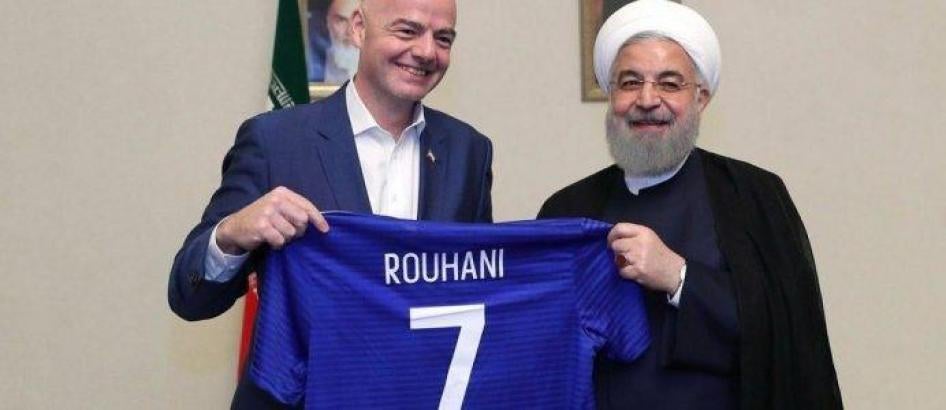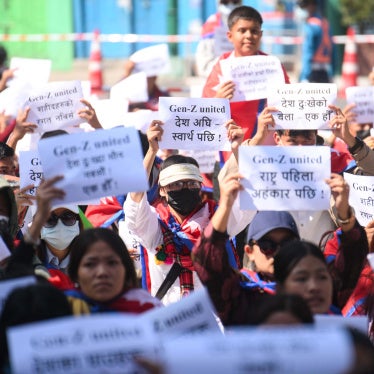Asian football is in a crisis. That’s because the leaders of the sport in Bahrain, Afghanistan and Iran are not effectively using their positions at the top of the football food chain to carry out FIFA’s new Human Rights Policy and to stop rights abuses against players, human rights defenders, and women.
These leaders include Sheikh Salman Bin Ibrahim Al-Khalifa of Bahrain, the FIFA vice president who was elevated unopposed to another four-year term atop Asian football as president of the powerful Asian Football Confederation (AFC) Saturday in Kuala Lumpur.
Article 3 of the FIFA and AFC Statutes requires the AFC and its leaders “promote and protect human rights.”
Yet Sheikh Salman remained silent when Bahrain tried extraditing Hakeem Al-Araibi—a former national football player who had been accepted as a refugee in Australia, earlier this year—despite strong statements by FIFA itself calling for his release.
Al-Araibi was arrested in Bahrain in 2012 and alleges that he was tortured in detention. He is still wanted there on charges that appear fabricated to punish him for speaking out against the government.
In a surprise move, the Football Federation Australia and ASEAN football federations backed Bahrain’s Sheikh Salman for re-election to head the powerful Asian Football Confederation.
Sheikh Salman should commit to uphold and to carry out FIFA’s 2017 Human Rights Policy, including in his home country.
He is not the only high-level football official who may not be acting in accordance with the policy. In 2018, 20 members of Afghanistan’s women’s national team made detailed allegations to the Guardian and to FIFA of sexual and physical abuse they say they suffered at the hands of the president of the Afghan Football Federation, Keramuddin Karim, and other officials.
FIFA suspended Karim for two 90-day periods and during this time he has reportedly threatened witnesses in the case. He stands accused of sexual assault, physical attacks, and intimidation.
Asian soccer official Prince Ali of Jordan had called for candidates from Afghanistan to be barred from elections while implicated in their federation’s “current crisis.” The federation general secretary Sayed Ali Reza Aghazada of Afghanistan was suspended, yet was also just elected to the AFC’s powerful governing body, the Executive Committee.
Human Rights Watch has urged both FIFA and the Afghan authorities to move decisively on their investigations to hold those responsible for the abuse accountable and to ensure that women who step forward are not stigmatized and threatened into silence.
Women and girls in Afghanistan have a right to play sports without fearing assault and harassment and regional football leaders have an obligation to investigate.
Finally, Iran’s Football Federation president, Mehdi Taj, was elevated to AFC vice-president. In Iran, women and girls have been fighting for four decades to overturn the ban on women going to stadiums for sports events.
The ban puts women and girls in danger as they take risks to protest and to attend soccer games dressed as men. Female photographers have to take extreme measures such as scaling rooftops outside the stadiums, to carry out their work. Women who are caught entering the stadiums disguised as men to see or photograph the matches risk being beaten or jailed.
On Friday, before the AFC election, Iranian women filed an unprecedented FIFA ethics complaint against Mehdi Taj, for his role in presiding over their exclusion from stadiums for years.
FIFA has said clearly in its second Human Rights Advisory Board report that the stadium ban for women violates FIFA’s statutes, which say such discrimination is “punishable by suspension or expulsion”.
The AFC football leaders from Bahrain, Afghanistan and Iran are bound by the FIFA code of ethics, the FIFA statutes and the FIFA human rights policy. FIFA has made admirable progress in implementing its new Policy , and could even raise the bar for other sports federations.
But FIFA’s reform efforts risk derailment if the sport’s leaders in Asia refuse to uphold the new global standards.
FIFA’s Gianni Infantino, up for re-election unopposed himself this year, needs to find his voice to call out football federation leaders who are undermining reforms. It is time to hold accountable those who are threatening the “beautiful game” with ugly human rights abuses.
Minky Worden is director of global initiatives at Human Rights Watch.









